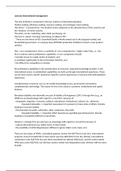Lectures International management
The why of Benito is answered in the four motives of internationzalization:
Market seeking, efficiency seeking, resource seeking, and (strategic) asset seeking.
The where “ is answered by : the location choice (depends on the attractiveness of the country) and
the ‘distance’ to home country.
The what, can be: marketing, sales, R&D, purchasing, etc.
The how is: export, licensing, franchising, JV/alliance FDI*
* There are two forms of FDI: Greenfield (build a wholly owned sub in the targeted market) and
brownfield (government or company buys EXISTING production facilities to launch a new product
activity).
FSA = core competencies. Firm is a portfolio of ‘core competencies’: higher-order FSAs, i.e., the
firm’s routines and recombination capabilities. A core competence should:
1.provide access to a wide variety of markets, and
2.contribute significantly to the end-product benefits, and
3.be difficult for competitors to imitate
Recombination capabilities is the orchestration of resources, especially knowledge bundles. In the
international arena, recombination capabilities are built up through international experience. These
can be Host-country specific experience (specific country experience) or General internationalization
experience.
Complementary resources can e.g. be market knowledge/access, government connections,
complementary technology. The reason for this is the cultural, economic, institutional and spatial
distance.
Bounded reliability and rationality are part of liability of foreignness (LOF): A foreign firm (e.g., an
MNE) has an disadvantage with regard to a local firm, because of:
- Geographic, linguistic, economic, political, educational, institutional, cultural, etc., distances.
(bounded rationality <> imperfect assessment of a present or future state of affairs, thereby
leading to incorrect beliefs)
- Discrimination by public authorities, other companies, the public
(bounded reliability <> imperfect effort towards pre-specified goal achievement, thereby
leading to incomplete fulfilment of promises).
However, a foreign firm can also have an advantage with regard to a local firm because of:
- cultural attractiveness (e.g. Italian shoes, French bread)
- the possibility of arbitrating between different regimes (labor costs, taxes, etc).
There are four types of MNEs: centralized exporter (moves his NLB FSAs to host LAs), international
projector (moves his NLB FSAs to host and he uses the NLB FSAs for the LAs; Disney), international
coordinator (uses NLB FSAs but uses them worldwide for optimal efficiency), and the multi-centred
MNE (uses some NLB FSAs, but the host country mostly has independent subs; Unilever with its many
brands).
,Lecture 2:
Home country LAs
There are basic factors and advanced factors, generalized factors and specialized factors.
Related and supporting industries: Industries that are sharing the same technology, inputs,
distribution channels, skills, customers, or that are providing complementary products.
Demand conditions: 3 broad attributes of the home demand conditions:(1) Nature of buyer needs,
(2) Size and pattern of growth of the home demand, and (3) Internationalization of domestic
demand.
Firms strategy, structure, and rivalry: The conditions in the nation governing; how companies are
created & organized, managed, the nature of domestic rivalry.
What is the big problem of Porter’s model when applied in the context of International Business?
According to Porter’s theory, a firm develops certain FSAs because the home country conditions
force the firm to do so. So, there is no real role for the host country!
Also: it is tautological, The framework is more descriptive than predictive, Operationalization
of many factors is difficult, Less applicable to small open economies and to resource-rich economies.
Host country LAs
Host country LAs and the motivations to internationalize are:
- Market seeking: Market size & growth, consumer wealth & taste, availability of sales channels,
availability of marketing and sales professionals.
- Efficiency seeking: Availability of production factors at low cost (labor, energy).
- Resource seeking: Availability of inputs (natural resources, material inputs, land, infrastructure).
- Strategic asset seeking: Availability of knowledge-related assets; availability of specialized
intermediaries and service providers. and
- Export platform: The goal of MNE activity is not only to produce cheap, but also to ship it to third
countries, so infrastructure is very important.
, Distance between home and host country
The higher the distance, the smaller the adequate transfer of NLB FSAs.
The need for LB FSAs is getting higher when distance is higher??
Lecture 3
The concept of culture
What is culture? In your head, influencing your thoughts and behaviors without you being aware of it
(“culturaldummy”) or with your imperfect awareness (“cultural intelligent individual”). Three
different views (among many others):•Culture is subconsciously influencing our thoughts and
behaviors •We attribute culture to others, and act upon these perceptions •We can use culture
strategically in choosing behaviors (and thoughts?).
Even mn boy Maslow tussendoor:






